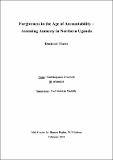| dc.contributor.advisor | Mullally, Siobhán | |
| dc.contributor.author | Bradfield, Paul Benjamin | |
| dc.date.accessioned | 2021-07-05T11:36:42Z | |
| dc.date.issued | 2021-07-05 | |
| dc.identifier.uri | http://hdl.handle.net/10379/16848 | |
| dc.description.abstract | In the year 2000, Uganda passed the Amnesty Act – a blanket amnesty law that effectively ended a 20-year rebellion by the Lord’s Resistance Army (“LRA”), reintegrating thousands of ex-combatants back into the community. Over 27,000 former combatants – from the LRA and other rebel groups – subsequently received amnesty under legislation that promised to demobilise, reintegrate and reconcile.
In the midst of domestic amnesty came judicial intervention from the International Criminal Court in 2004. Five arrest warrants for leading LRA commanders remained unexecuted until the arrest of Dominic Ongwen in 2015, who is now on trial in The Hague. Another LRA commander, Thomas Kwoyelo, applied for amnesty but this was rejected in a landmark Supreme Court Judgement in 2015. He too is on trial in Uganda. Under the letter of the Amnesty Act, both men were entitled to amnesty.
The views of both amnesty recipients and community members towards the amnesty process, its efficacy and legacy, remain largely unknown. The degree to which amnesty recipients have reintegrated and accepted by their community has also been under-examined. Furthermore, the impact of recent moves to prosecute former LRA fighters such as Ongwen and Kwoyelo, and their impact on the amnesty project, has not been thoroughly considered in the existing literature.
Drawing on empirical fieldwork conducted in northern Uganda in 2018, where the author interviewed ex-combatants who have received amnesty, as well as the communities in which they live, this thesis critically assesses the amnesty project in Uganda. It tackles the question of whether the Amnesty Act has achieved its core objectives of forgiveness and reintegration, and whether recent prospections have undermined its legacy. Moreover, the thesis considers to what extent Uganda’s experience with amnesty affects the “crystallising” anti-amnesty norm in international law, and further contributes to the ongoing discussion between scholars and jurists who debate whether amnesty can ever be a lawful response to serious crimes. | en_IE |
| dc.publisher | NUI Galway | |
| dc.rights | Attribution-NonCommercial-NoDerivs 3.0 Ireland | |
| dc.rights.uri | https://creativecommons.org/licenses/by-nc-nd/3.0/ie/ | |
| dc.subject | International Criminal Law | en_IE |
| dc.subject | Transitional Justice | en_IE |
| dc.subject | Amnesty | en_IE |
| dc.subject | Business, Public Policy and Law | en_IE |
| dc.subject | Law | en_IE |
| dc.subject | Uganda | en_IE |
| dc.title | Forgiveness in the age of accountability - Assessing Amnesty in northern Uganda | en_IE |
| dc.type | Thesis | en |
| dc.contributor.funder | National University of Ireland | en_IE |
| dc.local.note | In the year 2000, Uganda passed the Amnesty Act – a blanket amnesty law that effectively ended a 20-year rebellion by the Lord’s Resistance Army (“LRA”), reintegrating thousands of ex-combatants back into the community. Over 27,000 former combatants – from the LRA and other rebel groups – subsequently received amnesty under legislation that promised to demobilise, reintegrate and reconcile.
In the midst of domestic amnesty came judicial intervention from the International Criminal Court in 2004. Five arrest warrants for leading LRA commanders remained unexecuted until the arrest of Dominic Ongwen in 2015, who is now on trial in The Hague. Another LRA commander, Thomas Kwoyelo, applied for amnesty but this was rejected in a landmark Supreme Court Judgement in 2015. He too is on trial in Uganda. Under the letter of the Amnesty Act, both men were entitled to amnesty.
The views of both amnesty recipients and community members towards the amnesty process, its efficacy and legacy, remain largely unknown. The degree to which amnesty recipients have reintegrated and accepted by their community has also been under-examined. Furthermore, the impact of recent moves to prosecute former LRA fighters such as Ongwen and Kwoyelo, and their impact on the amnesty project, has not been thoroughly considered in the existing literature.
Drawing on empirical fieldwork conducted in northern Uganda in 2018, where the author interviewed ex-combatants who have received amnesty, as well as the communities in which they live, this thesis critically assesses the amnesty project in Uganda. It tackles the question of whether the Amnesty Act has achieved its core objectives of forgiveness and reintegration, and whether recent prospections have undermined its legacy. Moreover, the thesis considers to what extent Uganda’s experience with amnesty affects the “crystallising” anti-amnesty norm in international law, and further contributes to the ongoing discussion between scholars and jurists who debate whether amnesty can ever be a lawful response to serious crimes. | en_IE |
| dc.description.embargo | 2023-01-02 | |
| dc.local.final | Yes | en_IE |
| nui.item.downloads | 109 | |


